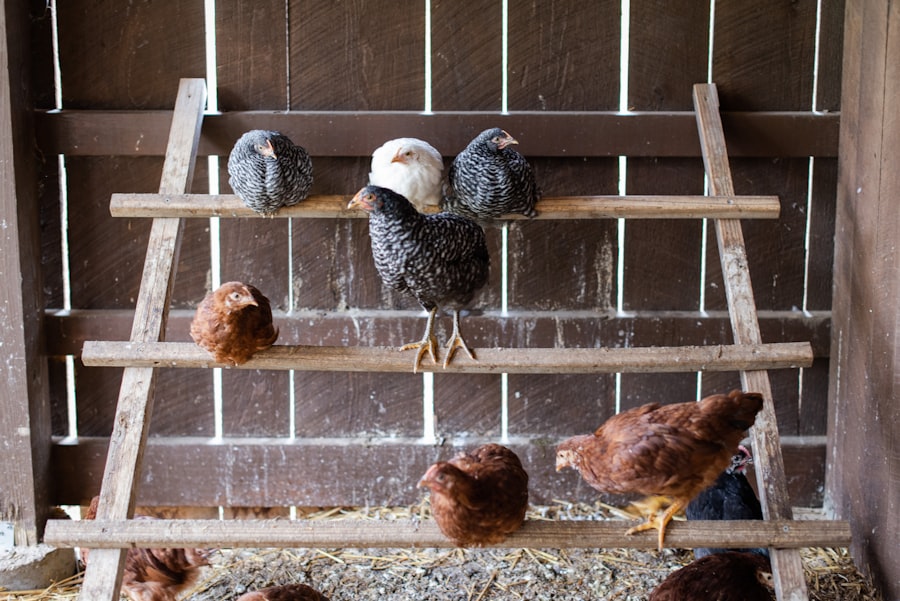Keeping chickens at home has become increasingly popular in recent years, and for good reason. Not only do chickens provide a sustainable source of fresh eggs, but they also offer a unique and rewarding hobby. The benefits of keeping chickens extend beyond just the practicality of having fresh eggs readily available. Chickens can also be great companions and provide entertainment with their quirky personalities and behaviors.
Personally, I have experienced the joys of keeping chickens firsthand. I started my own backyard flock a few years ago and it has been a truly rewarding experience. Not only do I enjoy the daily routine of caring for my chickens, but I also love the satisfaction of collecting fresh eggs each morning. There is something incredibly satisfying about knowing exactly where your food comes from and being able to provide for yourself in such a simple yet fulfilling way.
Key Takeaways
- Before keeping chickens, it is important to understand local laws and regulations, as well as zoning restrictions on chicken coops.
- Permits and licenses may be required for keeping chickens in certain areas.
- Health and safety considerations should be taken into account when choosing and caring for chicken breeds.
- Building a chicken coop requires careful consideration of size and design requirements.
- Proper feeding and waste management are essential for maintaining a healthy and odor-free chicken coop.
Understanding Local Laws and Regulations
Before embarking on your chicken-keeping journey, it is crucial to research and understand the local laws and regulations regarding backyard flocks. Each city or town may have its own specific rules regarding the number of chickens allowed, coop size and design requirements, and even noise restrictions.
To find information on local laws and regulations, start by contacting your city or town’s zoning department or animal control office. They will be able to provide you with the most up-to-date information regarding any restrictions or requirements for keeping chickens in your area. Additionally, many cities have online resources or handbooks available that outline the specific rules and regulations for backyard flocks.
Zoning Restrictions on Chicken Coops
One of the most important aspects to consider when keeping chickens at home is whether your property is zoned for such an activity. Zoning restrictions can vary greatly depending on where you live, so it is essential to find out if your property is zoned for keeping chickens before starting a backyard flock.
Zoning restrictions typically dictate the size and location of chicken coops, as well as the number of chickens allowed on a property. Some areas may have specific setbacks or distance requirements from neighboring properties or structures. It is important to familiarize yourself with these restrictions to ensure that your coop meets all necessary requirements.
To find out if your property is zoned for chickens, you can contact your local zoning department or consult the city’s zoning map. These resources will provide you with the information you need to determine if keeping chickens is allowed on your property.
Permits and Licenses for Keeping Chickens
In addition to zoning restrictions, some areas may require permits or licenses for keeping chickens. These permits are typically obtained through the city or town’s animal control office or health department. The purpose of these permits is to ensure that backyard flocks are properly maintained and do not pose a nuisance or health risk to the community.
The process for obtaining permits or licenses may vary depending on where you live, but generally involves filling out an application and paying a fee. Some areas may also require an inspection of the chicken coop before a permit is issued.
It is important to research and understand the specific requirements for obtaining permits or licenses in your area before starting a backyard flock. Failure to comply with these regulations could result in fines or other penalties.
Health and Safety Considerations
Keeping chickens healthy and safe is of utmost importance when maintaining a backyard flock. There are several common health issues that can affect chickens, including parasites, respiratory infections, and nutritional deficiencies.
To prevent these health issues, it is important to provide your chickens with a clean and well-maintained coop, fresh water, and a balanced diet. Regularly inspecting your chickens for signs of illness or injury can also help catch any potential problems early on.
Additionally, it is important to practice good biosecurity measures to prevent the spread of diseases. This includes limiting contact between your flock and other birds, regularly cleaning and disinfecting the coop, and quarantining new chickens before introducing them to the existing flock.
Choosing the Right Chicken Breeds

When starting a backyard flock, it is important to choose the right chicken breeds for your specific needs and preferences. There are hundreds of different chicken breeds to choose from, each with its own unique characteristics and traits.
Some breeds are known for their egg-laying abilities, while others are prized for their meat production. Some breeds are more docile and friendly, while others are more independent and flighty. It is important to consider factors such as egg production, temperament, and space requirements when choosing the right breed for your backyard flock.
Researching different chicken breeds and their specific characteristics can help you make an informed decision. Additionally, talking to local chicken owners or visiting a local farm or hatchery can provide valuable insight into the different breeds available.
Building a Chicken Coop: Size and Design Requirements
Building a chicken coop that meets size and design requirements is essential for keeping chickens at home. The size of your coop will depend on the number of chickens you plan to keep, as well as any specific requirements outlined by local laws or regulations.
In general, each chicken should have at least 4 square feet of indoor space in the coop, as well as 10 square feet of outdoor space in a run or fenced area. The coop should also provide adequate ventilation, protection from predators, and easy access for cleaning and maintenance.
When designing your coop, it is important to consider factors such as insulation, natural light, and ease of access for both chickens and humans. Additionally, providing nesting boxes for egg-laying and perches for roosting will help keep your chickens comfortable and happy.
Feeding and Caring for Your Chickens
Proper feeding and care are essential for keeping chickens healthy and happy. Chickens require a balanced diet that includes a combination of commercial feed, fresh water, and supplemental treats.
Commercial chicken feed is formulated to provide the necessary nutrients for optimal growth and egg production. It is important to choose a feed that is appropriate for the age and type of chickens you have. Additionally, providing fresh water at all times is crucial for keeping chickens hydrated and healthy.
Supplemental treats such as fruits, vegetables, and grains can be given in moderation to provide variety and enrichment for your flock. However, it is important to avoid feeding chickens foods that are toxic or harmful to their health.
Regularly cleaning the coop and providing fresh bedding will help prevent the buildup of waste and odors. Additionally, providing regular dust baths and access to outdoor space for scratching and foraging will help keep your chickens active and engaged.
Managing Waste and Odor Control
Managing waste and controlling odor in a backyard chicken coop is an important aspect of keeping chickens at home. Chicken manure can quickly accumulate and become a breeding ground for bacteria and parasites if not properly managed.
To manage waste, it is important to regularly clean the coop and remove soiled bedding. This can be done by scooping out soiled bedding with a shovel or rake, or by using a deep litter method where fresh bedding is added on top of the existing litter.
Composting chicken manure can also be a beneficial way to manage waste while creating nutrient-rich compost for your garden. However, it is important to properly compost the manure to ensure that any potential pathogens are killed off before using the compost in your garden.
To control odor in the coop, proper ventilation is key. Installing windows or vents in the coop will help circulate fresh air and prevent the buildup of ammonia fumes from chicken waste. Additionally, using absorbent bedding materials such as straw or wood shavings can help reduce odors.
Enjoying the Benefits of Keeping Chickens at Home
In conclusion, keeping chickens at home can be a rewarding and fulfilling experience. Not only do chickens provide a sustainable source of fresh eggs, but they also offer companionship and entertainment. By understanding and following local laws and regulations, building a suitable coop, and providing proper care and nutrition, you can enjoy the benefits of keeping chickens at home. So why not start a backyard flock and enjoy the rewards of fresh eggs and a fun hobby?
If you’re wondering about the best kind of coop for your chickens, look no further than this informative article from Poultry Wizard. They provide valuable insights on what kind of coop is best suited for your feathered friends. Whether you’re a beginner or an experienced chicken keeper, this article will guide you through the process of choosing the perfect coop that meets all your chickens’ needs. Check it out here: https://poultrywizard.com/keeping-chickens/what-kind-of-coop-is-best-for-chickens/.
FAQs
What are the laws regarding keeping chickens?
The laws regarding keeping chickens vary depending on the country, state, or city you live in. It is important to research and understand the laws in your area before keeping chickens.
Do I need a permit to keep chickens?
In some areas, a permit may be required to keep chickens. It is important to check with your local government to see if a permit is necessary.
How many chickens am I allowed to keep?
The number of chickens you are allowed to keep may vary depending on the laws in your area. Some areas may have a limit on the number of chickens you can keep, while others may not have any restrictions.
What are the requirements for keeping chickens?
The requirements for keeping chickens may vary depending on the laws in your area. Some common requirements include providing adequate shelter, food, water, and space for the chickens to roam.
What are the benefits of keeping chickens?
Keeping chickens can provide a source of fresh eggs, fertilizer for gardens, and entertainment. Chickens can also help control pests in your yard.
What are the potential drawbacks of keeping chickens?
Some potential drawbacks of keeping chickens include noise, odor, and the potential for attracting predators. It is important to consider these factors before deciding to keep chickens.
Meet Walter, the feathered-friend fanatic of Florida! Nestled in the sunshine state, Walter struts through life with his feathered companions, clucking his way to happiness. With a coop that’s fancier than a five-star hotel, he’s the Don Juan of the chicken world. When he’s not teaching his hens to do the cha-cha, you’ll find him in a heated debate with his prized rooster, Sir Clucks-a-Lot. Walter’s poultry passion is no yolk; he’s the sunny-side-up guy you never knew you needed in your flock of friends!







